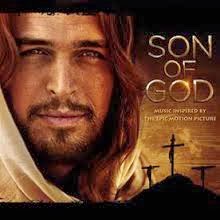Why I'm Not Excited about the Son of God Film
"It remains nothing more than a fairly incomplete depiction of Christ as a happy smiling wandering miracle worker that made some downtrodden people feel good about themselves."
Why do Christians require more faithfulness to Tolkien or C.S. Lewis than they do to the sacred text of Scripture? Perhaps it says much of where the American Church is that fiction is more guarded from Hollywood liberties than God's inspired Word. It's even worse when the producers claim devotion to that text.
To further explain, it may help to return to The Bible Series by Roma Downey and Mark Burnett
Here is my take on The Bible Series (scroll to the bottom of this blog post you are currently reading in order to see citations of discrepancies from other sources). I think that this post gives you an idea why I'm so skeptical of the Son of God film by them while the majority of Christians appear ecstatic.
Also, note an interview with Downey. In my opinion, she sounds pantheistic or panentheistic. Check it out for yourself and I would love to know your reaction.
Also, note an interview with Downey. In my opinion, she sounds pantheistic or panentheistic. Check it out for yourself and I would love to know your reaction.
I think the reason for the divide in the Church and even evangelicalism over this movie may come down to one's view of the Bible's inspiration.
If you think that Bible stories contained within the sacred text are no more than oral traditions handed down over millennia and then finally written down by an editor at a given point, you will present the Bible stories accordingly. I think this would explain so many Hollywood productions including works by Downey and Burnett. The details of the Bible aren't important to them because the actual stories found in the Bible are seen by them as so unlike the original with time and re-telling.
However, if you believe that God exercised extraordinary care in making sure that the Bible accurately reflects the actual events in the lives of Adam and Eve, Noah, Abraham, Jesus and on and on, then your art would reflect that high opinion of Scripture. Is the Bible the inspired Word of God or is it the recordings of the recollections of untold multiple generations handed down over and over, changing with each re-telling/generation before it came into our hands?
So, why are Bible-believing Christians going ga-ga over these films? I think there are a variety of reasons, two of which I will highlight here: 1) a desire to be relevant (i.e. cool in the sight of the world); 2) a false belief that people who see a film will suddenly read the real deal and become Bible believing Christians.
To the second, I would ask you how many people do you know who after watching a film decided to read the book? I think most movie-goers are not known for reading. Of those who are, they have already read the book, loved it and are passionate about it and therefore, they respond in two ways: 1) are excited that it is coming to film; 2) are very concerned that what they love in the book is what is portrayed accurately in the movie!
I may very well follow this up with a viewing of The Son of God movie and get back to you on it. However, if The Bible series is any indication, I don't expect it to be a positive review. Wouldn't it be great if I were pleasantly surprised? If so, you will hear about it! However, people tend to continue in their current tracks and Touched by an Angel and The Bible series do not give me hope for this film at all, especially in light of Roma Downey's religious views as expressed in that interview.
Note these citations of Discrepancies with the Biblical Text in The Bible miniseries
From The Bible TV Miniseries article by Wikipedia
Differences from the Bible
In the introduction to each episode, the message is displayed “This program is an adaptation of Bible stories that changed our world. It endeavors to stay true to the spirit of the book.”[32]
Note these citations of Discrepancies with the Biblical Text in The Bible miniseries
From The Bible TV Miniseries article by Wikipedia
Differences from the Bible
In the introduction to each episode, the message is displayed “This program is an adaptation of Bible stories that changed our world. It endeavors to stay true to the spirit of the book.”[32]
Roma Downey stated in an interview, “we had a great team of scholars and theologians helping us, making sure that we told these stories accurately and truthfully,”[33]
However, many of the story elements in the series have been criticized as deviating from the events described in the traditional text, and using too many creative licenses. These are included below:
In the book of Genesis, the angelic visitors were approached by Lot who insisted that they stay with him. Then they feasted with Lot in his home. The series shows the angels approaching Lot, begging for help with no hospitality extended to them.[34] (Genesis 19:1-5)
The text describes a mob gathered outside of Lot's home wanting to rape his two angelic visitors, and Lot offering his daughters instead. The series omits this.[35][36] (Genesis 19:4-10)
At the destruction of Sodom, the series shows the angels slaughtering some of the city's inhabitants. Critics refer to these as "Ninja Angels". This is not in the text.[37] (Genesis 19:1-17)
The series shows Abraham traveling with Isaac, a very short distance to the place where he was to sacrifice his son. In the Bible it is a three day journey and the two are accompanied by a donkey and two attendants.[38] (Genesis 22:1-4)
The series shows Sarah running after Abraham once she realizes he is going to sacrifice Isaac. This is not in the text.[39] (Genesis 22:1-19)
In the Binding of Isaac, the text describes a ram (adult) caught by its horns in a thicket. The miniseries depicts a juvenile lamb caught by its leg[40] (Genesis 22:13)
After David's affair with Bathsheba and the killing of Uriah the Hittite, he is confronted by Nathan. The series depicts David as resistant or even indignant, whereas in the text, David is remorseful for his sin and admits his guilt, leading him to write Psalm 51 and beg forgiveness from God[41] (2 Samuel 12:13, Psalms 51)
When the Babylonians destroy Jerusalem, Jeremiah is depicted as escaping unnoticed by the invaders. In the text Jeremiah is captured, bound in chains and later released[40] (Jeremiah 39:11-40:6)
The show depicts Daniel and his three compatriots being captured during the siege, when in fact, they were deported more than a decade before Jerusalem’s destruction[40] (Daniel 1; 2 Kings 24:10-16)
When Shadrach, Meshach, and Abednego refuse to worship King Nebuchadnezzar's golden statue, the miniseries depicts them as being tied up, with a fire lit under them. In the text, the king orders the three to be thrown into a furnace that was heated seven times hotter than usual. In fact, the text describes the furnace as being so hot, that some of Nebuchadnezzar's "strongest soldiers" who threw them in there where killed by the flames while doing so.[42] (Daniel 3:19-23)
The miniseries's depicts the prophet Isaiah as a contemporary of Daniel, living during the time of the Babylonian exile. This is a major inconsistency with the text as Isaiah prophesied that Cyrus the Persian would release the captives after a period of time. This prophecy occurred 150 years before Cyrus was born, 180 years before Cyrus performed any of these feats (and he did, eventually, perform them all), and 80 years before the Jews were taken into exile[43] meaning that Daniel, Cyrus and Isaiah could never have existed contemporaneously at the same time. (Isaiah 44:28; 45:1; and 45:13).
In the miniseries' depiction of the Temptation of Christ, the Devil took Jesus to a high mountain when he tempted Jesus to throw himself down. In the text, the Devil tempted Jesus to throw himself down from the pinnacle of the temple. The high mountain was where the devil tempted Jesus to worship him.[33][40] (Matthew 4:1-11 and Luke 4:1-13)
3 Reasons I Don’t Enthusiastically Recommend the History Channel’s “The Bible: The Epic Miniseries”
a post by Andy Naselli — May 14, 2013
Here is a summary of Andy Naselli's thoughts as presented on his blog:
1. It does not consistently present God as great and good.
The OT stories in particular depict God as capricious, bloodthirsty, and vengeful. It doesn’t root God’s righteous wrath in his glorious holiness. It doesn’t explain, for example, why God pours out his wrath in Noah’s flood or why Jesus came to earth and then died on the cross. Instead, the series focuses on telling part of the Bible’s story in a hip, entertaining way.
2. It gratuitously displays graphic violence.
The Bible is a violent book, but it doesn’t glory in the gore like these films do. The graphic violence is relentless and gratuitous.
3. It repeatedly changes important details.
Obviously, a short video-overview of the Bible (like a children’s story-Bible book) can’t include all the details, but the details it chooses to include should be accurate. This series repeatedly changes important details
At the end of his citations of the discrepancies with the biblical accounts, Andy concludes:
These sorts of changes may have only minor effects on people who watch this series and know little about the Bible. Many will think, “Oh! So that’s where that comes from! David spoke Psalm 23 right before he killed Goliath!’” Ideally, this will compel people to read the Bible for themselves. But I suspect that it will mislead and confuse people regarding details.
(I would encourage you to click on the link provided and read Andy Naselli's complete post. It is well worth your time to do so)
Tim Challies addressed something that occurred to me when I was talking to supporters and those less enthusiastic like myself. In the interviews, as far as I could see, there was lots of talk of God's love but where was the sin of mankind and God's wrath poured out on Jesus on the cross in order to pay for that sin?
Here are Tim Challies' thoughts: Son of God Will Show Crucifixion, Not the Cross
I like what Challies had to say because he addresses the notion that people will see the movie and somehow have a spiritual experience of conversion as a result (either by means of the movie itself or by responding to an invitation to watch and then a conversation/s to follow).
Tim Challies addressed something that occurred to me when I was talking to supporters and those less enthusiastic like myself. In the interviews, as far as I could see, there was lots of talk of God's love but where was the sin of mankind and God's wrath poured out on Jesus on the cross in order to pay for that sin?
Here are Tim Challies' thoughts: Son of God Will Show Crucifixion, Not the Cross
I like what Challies had to say because he addresses the notion that people will see the movie and somehow have a spiritual experience of conversion as a result (either by means of the movie itself or by responding to an invitation to watch and then a conversation/s to follow).



Comments
Post a Comment